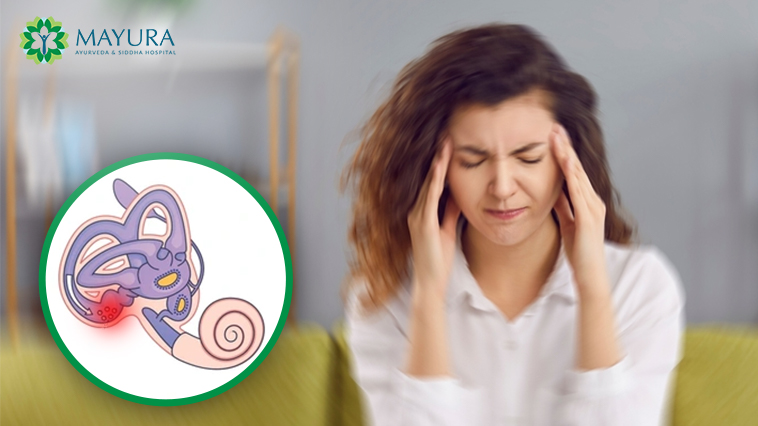Vertigo is a sensation of spinning or dizziness, often accompanied by nausea and imbalance. It is a symptom rather than a disease and can result from various underlying conditions affecting the inner ear or brain.

Caused by problems in the inner ear.
Benign Paroxysmal Positional Vertigo (BPPV): Caused by small calcium particles (canaliths) clumping in the inner ear canals.
Ménière's Disease: A disorder of the inner ear causing vertigo, tinnitus, hearing loss, and a feeling of fullness in the ear.
Vestibular Neuritis/Labyrinthitis: Inflammation of the inner ear or the nerve connecting the inner ear to the brain, usually due to an infection.
Caused by problems in the brain.
Migraine-associated Vertigo: Vertigo associated with migraine headaches.
Stroke: Blood flow problems in the brain can cause vertigo.
Multiple Sclerosis: Can affect the nerves that control balance.
Ayurveda offers various treatments aimed at managing vertigo and improving overall well-being. These treatments should complement conventional medical care.
Ayurvedic treatments should be used as complementary therapies alongside conventional medical treatment. Consulting both medical professionals and certified Ayurvedic practitioners is recommended for a holistic approach to managing vertigo.
ఏడేళ్ల సైనస్ సమస్యకు 2 నెలల వైద్యంతో పరిష్కారంఅలర్జీలు కూడా మటుమాయం
నా ఆర్థరైటిస్ సమస్యకు అలోపతి పనిచేయలేదుఆయుర్వేద థెరపీస్తో 60 % రిలీఫ్ చూశా - మహిళా ఉద్యోగి
వెరికోస్ వీన్స్కు మయూర ఆయుర్వేదలో జలగ వైద్యంఫలితం చూసి సంతోషిస్తున్న పరమేశ్వరి గారు
21 రోజుల పాటు మయూరలో థెరపీస్మోకాళ్ల నొప్పులు మటుమాయం చేసిన డాక్టర్లు
నడవడం కూడా కష్టమైన శ్యామల గారికి సుదీర్ఘ వైద్యంమయూర ఆయుర్వేదంలో కాళ్ల నొప్పులకు శాశ్వత పరిష్కారం
నడవడం కూడా కష్టమైన శ్యామల గారికి సుదీర్ఘ వైద్యంమయూర ఆయుర్వేదంలో కాళ్ల నొప్పులకు శాశ్వత పరిష్కారం
మెడనొప్పి, తలనొప్పి నుంచి 75% రిలీఫ్ఏళ్ల నుంచీ పడిన బాధను తీసేసిన మయూర ఆయుర్వేద
బ్యాక్పెయిన్కు సర్జరీ తప్పదన్న అలోపతి డాక్టర్లుఎలాంటి సర్జరీ లేకుండా థెరపీస్తోనే తగ్గించిన మయూర
8 ఏళ్ల స్పాండిలైటిస్ బాధకు నెల రోజుల్లోనే ఉపశమనంమయూర ఆయుర్వేద వైద్యానికి హ్యాట్సాఫ్
HBA1c లెవెల్ సగానికి సగం తగ్గింది| మానసికంగా, శారీరకంగా ఫిట్ | Mayura Ayurvedaకు థ్యాంక్స్
ఏడాది మోకాళ్ల నొప్పులను 5 వారాల్లో నయం చేసిన మయూర ఆయుర్వేద డాక్టర్లు
మహిళా రైతు సర్వైకల్ స్పాండిలైటిస్ బాధ తగ్గించిన Mayura Ayurveda వైద్యులు| 30 రోజులకే మంచి రిలీఫ్
ఏడేళ్ల చేతుల నొప్పికి 30 రోజుల్లో పరిష్కారం| చేతులకు మళ్లీ జీవం తెచ్చిన Mayura Ayurveda|#painrelief
తీవ్రంగా బాధించిన మోకాళ్ల నొప్పులు పరార్! Mayura వైద్యంతో మంచి రిలీఫ్ పొందిన టైలర్ గారు Knee Pain
అతి తక్కువ ధర, అత్యద్భుత వైద్యం! యాక్సిడెంట్ తర్వాతి నొప్పులను దూరం చేసిన Mayura Ayurveda డాక్టర్స్
వృద్ధులకు కల్పతరువుగా Mayura Ayurveda, ఆపరేషన్ లేకుండా మోకాళ్ల నొప్పులు దూరం | క్యూకడ్తున్న పెద్దలు
Mayura వైద్యానికి 10/10 మార్కులు ! ఎన్నో ఏళ్లుగా అనుభవించిన Back Pain పోయిందన్న ఐటీ కంపెనీ బాస్
వెర్టిగో, నీరసం, మెడ నొప్పితో..బాధపడ్తూన్న అరుణ దేవనూర్ గారుచెవుల్లో నీరు కారే సమస్య
ఎన్నో ఏళ్ల నుంచి బ్యాక్ పెయిన్, మూత్రం సరిగ్గా రాకపోవడం డయాబెటిస్తో అనేక సమస్యలు నుంచి ఉపశమనం
చాలా ఏళ్ల నుంచి తీవ్రమైన మోకాళ్ల నొప్పులు కొన్ని అడుగులు కూడా వేయలేని స్థితి నుంచి నడిచే స్థాయికి
8 నెలలుగా షుగర్, ప్రారంభ దశలోనే షుగర్కు చెక్ పెట్టిన మయూర వైద్య బృందం
ఫ్రోజెన్ షోల్జర్తో ఏడాదిగా తీవ్ర ఇబ్బంది! Mayura అగ్నికర్మతో అద్భుత రిలీఫ్ | రూ.1500 ఖర్చుతోనే
అల్సరేటివ్ కొలిటివ్స్కు Mayuraలో రూ.1500కే అద్భుత చికిత్స! ఎన్ని ఆస్పత్రులు తిరిగినా లేని ప్రయోజనం
నా స్పాండిలైటిస్ బాధ మాటల్లో చెప్పలేను, Mayura Ayurvedaలో అగ్నికర్మ థెరపీ ఒక అద్భుతం| Patient Talk
ఎన్నో హాస్పిటల్స్ తిరిగినా తగ్గని సర్వైకల్ స్పాండిలైటిస్, Mayura Ayurveda వైద్యంతోనే పరిష్కారం
పదేళ్లుగా మోకాళ్ల నొప్పులు.. నిలబడి వంట చేసుకోలేకపోయేదాన్ని! నా బాధలను Mayura Ayurveda దూరం చేసింది!
ఇంత ఓపికగా వినే డాక్టర్లు ఎక్కడా చూడలేదు! 2ఏళ్లుగా పడ్తున్న మోకాళ్ల నొప్పి తక్కువ ఖర్చులో తగ్గించారు
ఎక్కడెక్కడో తిరిగినా తగ్గని thyroid, వెరికోస్ వీన్స్, గ్యాస్టరైటిస్ సమస్యలు Mayura లోనే తగ్గాయ్!
నిత్యనరకంగా మారిన డయాబెటిస్ నుంచి ఉపశమనం!మయూర ఆయుర్వేదలో అద్భుత చికిత్సా విధానం.
మోకాళ్లు నొప్పులు, కీళ్ల నొప్పులు,వాపు, ఎముకలు గుల్లబారడం, దీర్ఘకాలిక చర్మ సమస్యల నుండి విముక్తి?
మధుమేహం వలన బిగుసుకు పోయిన భుజానికి అగ్ని కర్మ చికిత్స ద్వారా తిరిగి భుజం కదులుతుంది.